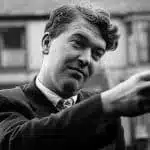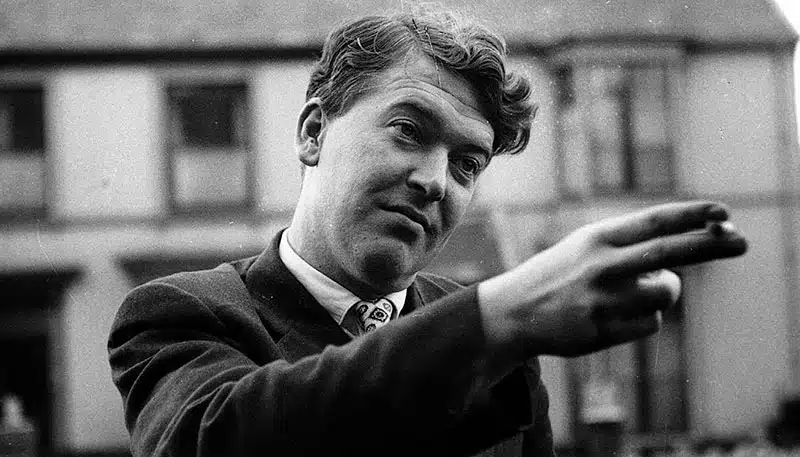‘May I join you?’
The medium-sized man with the undistinguished clothes and the blank, anonymous face looked up at Pettigrew, who, glass of beer in hand, stood facing him across the small corner table. Pettigrew, tall, handsome and of fully moulded features, had about him an intent, almost excited air that, in different circumstances, might have brought an unfavourable response, but the other said amiably,
‘By all means. Do sit down.’
‘Can I get you something?’
‘No, I’m fine, thank you,’ said the medium-sized man, gesturing at the almost full glass in front of him. In the background was the ordinary ambience of bar, barman, drinkers in ones and twos, nothing to catch the eye.
‘We’ve never met, have we?’
‘Not as far as I recall.’
‘Good, good. My name’s Pettigrew, Daniel R. Pettigrew. What’s yours?’
‘Mason. George Herbert Mason, if you want it in full.’
‘Well, I think that’s best, don’t you? George … Herbert … Mason.’ Pettigrew spoke as if committing the three short words to memory. ‘Now let’s have your telephone number.’
Again Mason might have reacted against Pettigrew’s demanding manner, but he said no more than, ‘You can find me in the book easily enough.’
‘No, there might be several … We mustn’t waste time. Please.’
‘Oh, very well; it’s public information, after all. Two-three-two, five—’
‘Hold on, you’re going too fast for me. Two … three … two …’
‘Five-four-five-four.’
‘What a stroke of luck. I ought to be able to remember that.’
‘Why don’t you write it down if it’s so important to you?’
At this, Pettigrew gave a knowing grin that faded into a look of disappointment. ‘Don’t you know that’s no use? Anyway: two-three-two, five-four-five-four. I might as well give you my number too. Seven—’
‘I don’t want your number, Mr Pettigrew,’ said Mason, sounding a little impatient, ‘and I must say I rather regret giving you mine.’
‘But you must take my number.’
‘Nonsense; you can’t make me.’
‘A phrase, then – let’s agree on a phrase to exchange in the morning.’
‘Would you mind telling me what all this is about?’
‘Please, our time’s running out.’
‘You keep saying that. This is getting—’
‘Any moment everything might change and I might find myself somewhere completely different, and so might you, I suppose, though I can’t help feeling it’s doubtful whether—’
‘Mr Pettigrew, either you explain yourself at once or I have you removed.’
‘All right,’ said Pettigrew, whose disappointed look had deepened, ‘but I’m afraid it won’t do any good. You see, when we started talking I thought you must be a real person, because of the way you—’
‘Spare me your infantile catch-phrases, for heaven’s sake. So I’m not a real person,’ cooed Mason offensively.
‘I don’t mean it like that, I mean it in the most literal way possible.’
‘Oh, God. Are you mad or drunk or what?’
‘Nothing like that. I’m asleep.’
‘Asleep?’ Mason’s nondescript face showed total incredulity.
‘Yes. As I was saying, at first I took you for another real person in the same situation as myself: sound asleep, dreaming, aware of the fact, and anxious to exchange names and telephone numbers and so forth with the object of getting in touch the next day and confirming the shared experience. That would prove something remarkable about the mind, wouldn’t it? – people communicating via their dreams. It’s pity one so seldom realizes one’s dreaming: I’ve only been able to try the experiment four or five times in the last twenty years, and I’ve never had any success. Either I forget the details or I find there’s no such person, as in this case. But I’ll go on—’
‘You’re sick.’
‘Oh no. Of course it’s conceivable there is such a person as you. Unlikely, though, or you’d have recognized the true situation at once, I feel, instead of arguing against it like this. As I say, I may be wrong.’
‘It’s hopeful that you say that.’ Mason had calmed down, and lit a cigarette with deliberation. ‘I don’t know much about these things, but you can’t be too far gone if you admit you could be in error. Now let me just assure you that I didn’t come into existence five minutes ago inside your head. My name, as I told you, is George Herbert Mason. I’m forty-six years old, married, three children, job in the furniture business … Oh hell, giving you no more than an outline of my life so far would take all night, as it would in the case of anybody with an average memory. Let’s finish our drinks and go along to my house, and then we can—’
‘You’re just a man in my dream saying that,’ said Pettigrew loudly. ‘Two-three-two, five-four-five-four. I’ll call the number if it exists, but it won’t be you at the other end. Two-three-two—’
‘Why are you so agitated, Mr Pettigrew?’
‘Because of what’s going to happen to you at any moment.’
‘What … Is this a threat?’
Pettigrew was breathing fast. His finely drawn face began to coarsen, the pattern of his tweed jacket to become blurred. ‘The telephone!’ he shouted. ‘It must be later than I thought!’
‘Telephone?’ repeated Mason, blinking and screwing up his eyes as Pettigrew’s form continued to change.
‘The one at my bedside! I’m waking up!’
Mason grabbed the other by the arm, but that arm had lost the greater part of its outline, had become a vague patch of light already fading, and when Mason looked at the hand that had done the grabbing, his own hand, he saw with difficulty that it likewise no longer had fingers, or front or back, or skin, or anything at all.

Bibliographic data
Author: Kingsley Amis
Title: Mason’s Life
Published in: The Sunday Times, 1972
[Full text]

